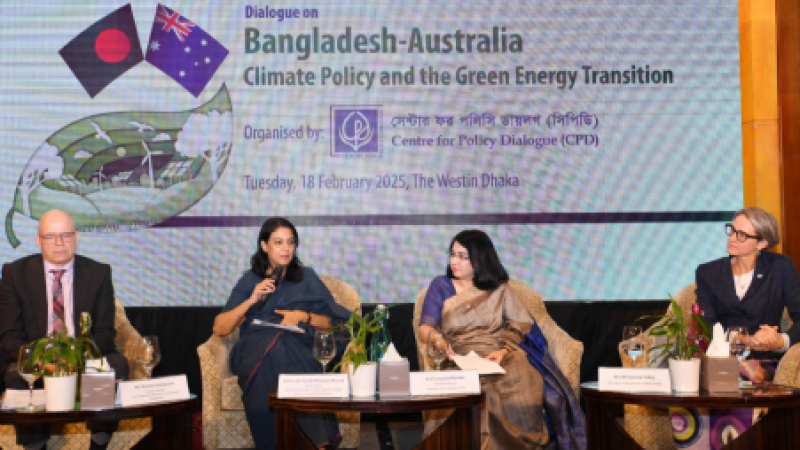- Power generation at Payra Thermal Power Plant 1st unit starts after a month |
- Irregularities, injustice will no longer be accepted in politics: Jamaat Ameer |
- 2 arrested in Jhenaidah for allegedly selling madrasa student |
- Koko’s wife campaigns for Tarique in Dhaka-17 |
- Bangladeshi Expats Cast 4.58 Lakh Postal Votes |
Bangladesh Seeks Australia's Support for Green Energy Shift

Bangladesh’s Environment, Forest and Climate Change Adviser, Syeda Rizwana Hasan, has called on the Australian government to provide financial assistance—either through grants or concessional loans—to support Bangladesh's green energy transition. She made this appeal during a dialogue on Bangladesh-Australia Climate Policy and Green Energy Transition, hosted by the Centre for Policy Dialogue (CPD) at a city hotel today.
Rizwana emphasized the growing carbon emissions in Bangladesh, particularly from coal-based power plants, which contribute 28% of the country's total air pollution. “While Bangladesh emits little carbon globally, national emissions are rising. Australia can play a pivotal role in financing our climate initiatives and energy transition,” she said.
However, Rizwana acknowledged the challenges posed by Bangladesh's existing financial commitments, which are slowing the shift to renewable energy. “The green energy transition won’t be swift due to the heavy financial burden from ongoing power sector agreements,” she noted. “These are legally binding contracts that we cannot easily get out of, and we must carry them for the next few years.”
She further highlighted the double burden faced by Bangladesh: suffering from climate change despite minimal contribution and taking on loans that future generations will need to repay. “It’s a double jeopardy for a country like us,” she said.
Rizwana also raised concerns about the financial strain from energy expenses, urging Bangladesh to reconsider its dependence on energy imports. “Prices fluctuate, and markets are volatile, which consumes a significant portion of our available resources,” she explained.
In her opening remarks, Australian High Commissioner to Bangladesh, Susan Ryle, outlined Australia’s global climate efforts. She said, “We are working with the International Finance Corporation (IFC) in Bangladesh to unlock commercial investments in the power sector and explore pathways to achieve net-zero in the energy sector. Building regional clean energy supply chains is essential.”
Susan also pointed out that the appointment of a dedicated ambassador for climate change reflects Australia’s commitment to international collaboration on tackling the climate crisis, including with Bangladesh.
During the panel discussion, Fahmida Khatun, Executive Director of the CPD, expressed concern about Bangladesh’s renewable energy targets, noting that the country aims to generate 10% of its power from renewables by 2025 and 40% by 2041. “However, the contribution from green energy remains low,” she pointed out.
In response, Rizwana emphasized the need for massive, long-term planning for the green transition, but noted the time constraints of the interim government. “Bangladesh will be one of the worst affected by climate change. We are already facing challenges and must ensure our investments are climate resilient,” she concluded.
The event also featured Kristin Tilley, Australia’s Ambassador for Climate Change, Martin Holtmann, Country Manager of IFC for Bangladesh, Bhutan, and Nepal, and Khondaker Golam Moazzem, CPD’s Research Director, who presented a detailed paper on the topic. The session was moderated by Fahmida Khatun.

